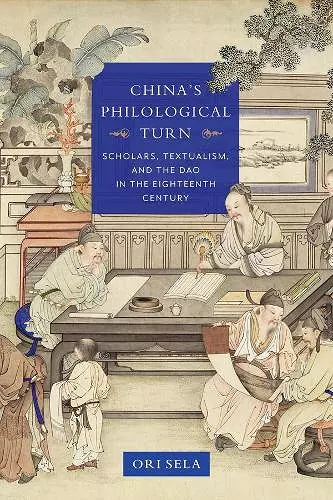China's Philological Turn
Scholars, Textualism, and the Dao in the Eighteenth Century
Format:Hardback
Publisher:Columbia University Press
Published:18th May '18
Currently unavailable, and unfortunately no date known when it will be back

In China's Philological Turn, Ori Sela explores the intellectual transformation in eighteenth-century China, focusing on Qian Daxin's influence on philology and its lasting effects.
In the eighteenth century, China experienced a significant intellectual transformation, marked by the rise of philology. China's Philological Turn by Ori Sela highlights the contributions of the polymath Qian Daxin, who played a pivotal role in this era of scholarship. The focus on philology brought forth a critical examination of sources, emphasizing the importance of truth and evidence in restoring ancient texts and meanings. This emphasis on factual accuracy not only shaped academic discourse but also influenced the broader political, social, and cultural landscapes of the time.
Sela intricately weaves together the social networks of scholars and their knowledge production, shedding light on the texts they engaged with and their reading practices. The book delves into the complexities of intellectual life during the eighteenth century, addressing the tension between the revered status of antiquity and the realities of what it entailed. Additionally, China's Philological Turn explores the status of scientific knowledge, particularly in fields such as astronomy and mathematics, while examining how cultural anxieties informed scholarly debates and shaped collective identities.
Through a rich tapestry of manuscripts, letters, and personal accounts, Sela reveals the creativity and openness of these intellectuals. This pioneering work not only reconstructs the history of Chinese learning during this transformative period but also highlights the enduring impact of philological scholarship on contemporary understandings of identity and knowledge.
Ori Sela clearly and persuasively argues for the importance of the philological turn in the late eighteenth century, explaining fully the larger moral and intellectual justification for the turn and its significance for the whole course of Chinese intellectual history. This book also treats an extremely important figure in the history of Chinese scholarship, Qian Daxin. Sela makes clear both the remarkable range and depth of Qian’s philological scholarship and the crucial moral and ethical importance that Qian saw in what has often been dismissed as dry pedantry. -- Cynthia Brokaw, Brown University
In China’s Philological Turn, Sela explicates the superlative classical scholarship championed by the literatus Qian Daxin (1728–1804). Among the leading classicists in Qing China, Qian and his students and colleagues were forgotten after the Opium War. Overlapping the prisms of society, ideas, and science, Sela reexamines China’s eighteenth-century philological revolution and convincingly shows that modern historians have generally overlooked the ‘philological turn’ from the eighteenth to the nineteenth century. -- Benjamin A. Elman, Princeton University
In this rich and lucidly argued account of the mid-Qing revolution in Chinese intellectual thought and identity, presented on its own terms and within the contexts of social history and the history of science, Ori Sela definitively lays to rest outdated understandings of China's relation to the modern world. It is a timely reminder of the contemporary resonance of historical understanding. -- Joanna Waley-Cohen, Julius Silver Professor of History, New York University and Provost, NYU Shanghai
A well-researched work and offers a new standard for the comprehensive study of high-Qing polymaths. For years
to come, it will be an important reference for conceiving the relationship between Han learning and Song learning, philology and science, social network and scholarly pathway. * East Asian Science, Technology, and Medicine *
- Commended for Pre-1900 Joseph Levenson Book Prize, Association for Asian Studies 2020
ISBN: 9780231183826
Dimensions: unknown
Weight: unknown
328 pages